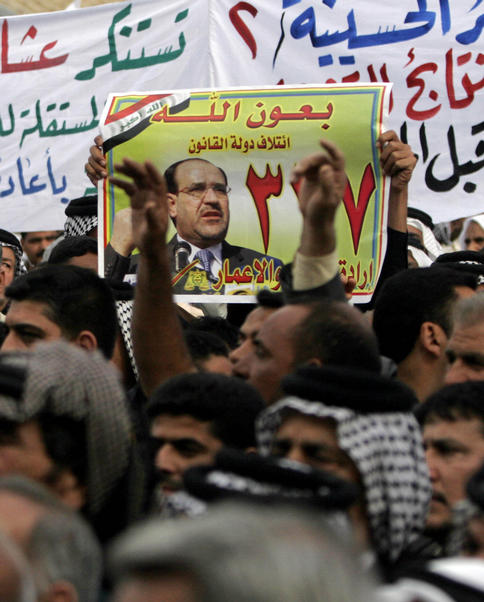BAGHDAD — Iraqi election results today will likely show a virtual tie between the two top vote-getting blocs led by the prime minister and his chief rival, a political equation that could add up to bitter political wrangling and risk reigniting violence.
Prime Minister Nouri al-Maliki, a Shiite who enjoys wide support with the Shiite majority, is neck and neck with former Prime Minister Ayad Allawi, who’s popular with Iraq’s Sunni minority.
If neither camp emerges with a clear mandate, many fear that a drawn-out political debate to form a government could spill over into violence and complicate American efforts to speed up troop withdrawals in the coming months.
Interior Minister Jawad al-Bolani, himself a candidate, called for Iraq’s electoral commission to hold off on releasing the tally today because he fears the political rivalries could erupt into violence.
Many Iraqis fear a return to violence between the Sunni and Shiite factions amid the horse-trading that will ramp up in earnest once all results are made public.
Al-Maliki’s coalition has drawn much of its support from the Shiite majority, and his attempts to appeal to Sunnis were undercut by his support for a ban on many Sunni candidates for alleged ties to Saddam Hussein’s regime.
The Sunnis largely threw their support behind Allawi’s Iraqiya bloc, which is headed by a Shiite but has billed itself as secular.
Iraq’s Kurdish faction sees itself as a key electoral kingmaker, though followers of radical anti-U.S. Shiite cleric Muqtada al-Sadr could also play a pivotal role after garnering a significant number of seats.
“Everybody’s talking to everybody,” said Michael Hanna, an Iraq analyst with the Century Foundation. “None of these governments make a whole lot of sense in terms of consistent ideologies. It’s all about wielding power.”
A senior Sadrist official, Amir Taher al-Kinani, warned Thursday that it is important that Allawi’s Iraqiya coalition not be sidelined because it represents the Sunni spectrum and because excluding the bloc could lead to conflict. “We fear the violent acts and then another unstable four years,” he said.
Today’s announcement will have the full results – and more importantly, the number of parliamentary seats per bloc.
“The difference between the leader and the second place will be one to two seats,” Independent High Electoral Commission chief Faraj al-Haidari told The Associated Press, although he would not say who was ahead.
In the overall tally, with 95 percent of the votes counted, al-Maliki’s coalition narrowly trails Allawi’s bloc. But al-Maliki’s coalition is ahead in seven of Iraq’s 18 provinces, compared with Allawi’s five. The allocation of parliament seats is based on votes counted per province.
Whoever succeeds in forming a government – a process that could take months – will be able to reward allies with control of government ministries and the jobs that go with them. He will also preside over a pivotal moment in Iraq’s postwar history: the withdrawal of U.S. forces.
Send questions/comments to the editors.



Success. Please wait for the page to reload. If the page does not reload within 5 seconds, please refresh the page.
Enter your email and password to access comments.
Hi, to comment on stories you must . This profile is in addition to your subscription and website login.
Already have a commenting profile? .
Invalid username/password.
Please check your email to confirm and complete your registration.
Only subscribers are eligible to post comments. Please subscribe or login first for digital access. Here’s why.
Use the form below to reset your password. When you've submitted your account email, we will send an email with a reset code.